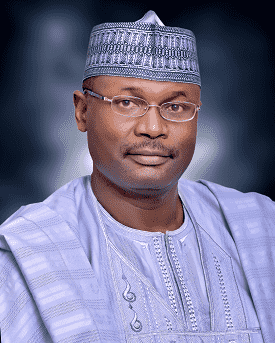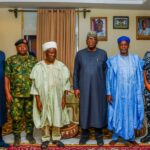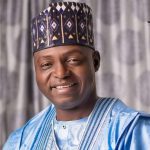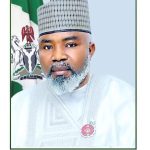By David Onuoja, Abuja
First of all, lets begin with who is Mahmood Yakubu, what is his status before his appointment as INEC Chairman, how far has he fare with his former job, before the appointment as INEC Boss in 2015.
Professor Mahmood Yakubu was born in Bauchi in May 1962. He attended Teachers’ College, Toro, Bauchi State from 1975 to 1980 and obtained the Grade II Teachers’ Certificate in 1980 top of his class. He undertook his undergraduate studies at the University of Sokoto (now Usmanu Danfodiyo University) from 1980 to 1985 and was Federal Government Merit Award scholar from 1983 to 1985. He graduated with a first class honours degree in History in 1985, winning the Waziri of Sokoto Prize for the Best Graduating Student and setting an enduring record as the first student from Northern Nigeria to graduate with a first class in history.
Following his one year NYSC in 1985/86 as an academic assistant in the Department of History, University of Jos, he enrolled at the University of Cambridge, United Kingdom in 1986 with the Cambridge Commonwealth Trust Scholarship and obtained the Master of Philosophy (M.Phil) degree in International Relations in 1987.
He then proceeded to the University of Oxford in the same year with the Commonwealth Scholarship and obtained the Doctor of Philosophy (D.Phil) Degree in History in 1991 at the age of 29 years. At Oxford, he was a three-time winner of the Overseas Research Students’ Award of the Committee of Vice Chancellors of United Kingdom Universities and the Beit Fund Research Grant.
Professor Yakubu began his academic career as a Graduate Assistant at the University of Jos in 1986, from where he proceeded to the United Kingdom for his postgraduate studies. He returned to the University in 1992 as Lecturer I. In 1993, he moved to the Nigerian Defence Academy, Kaduna as a Senior Lecturer and rose to the rank of Reader in 1995 and Professor in 1998. At the NDA, he was Head, Department of History from 1994 to 1995, Dean, Faculty of Arts and Social Sciences and Director of Academic Planning from 1998 to 2000, Member, Armed Forces Selection Board from 1998 to 2003, Dean, Faculty of Arts and Social Sciences for a second time from 2002 to 2004, Chairman, Management Board of the Staff School from 2004 to 2006 and pioneer Dean, Post Graduate School in from 2004 to 2006. He has more than 50 publications to credit.
In 2007, he was appointed as the Executive Secretary of the Education Trust Fund (ETF), which later became the Tertiary Education Trust Fund (TETFund). In this position, he served as a member of the Federal Government team on the Renegotiation of the Federal Government Agreement with the Academic Staff Union of Universities (ASUU) under the Chairmanship of Deacon Gamaliel Onosode. He was also member of the Presidential Task Team on Education, the Committee on Presidential Scholarship for Innovation and Development (PRESID), Implementation Committee on the Presidential Fund for the Revitalization of Nigerian Public Universities.
At the expiration of his term at TETFund in 2012, Professor Yakubu had within a period of five years surmounted several challenges to introduce several innovations in the country’s tertiary education system. These innovations include the Academic Staff Training and Development programme, under which over 6,000 lecturers from various Higher Education Institutions were sponsored for postgraduate degree programmes at various Nigerian universities and over 2,000 in Universities overseas; the Special High Impact Intervention Project, directed at the systematic development of the teaching, learning and research facilities in selected HEI, with 20 Universities, 12 Polytechnics and 12 Colleges of Education across the six geo-political zones as beneficiaries;
He served as the Assistant Secretary in charge of finance and administration during the Good luck Jonathan’s National Conference in 2014.
Above are some of the things one may need to know before going into the subject matter on his performance, misconception and fact about him. Again, what was stated above does not make him a saint anyway, but there are things this man has put in place in INEC that can never be forgotten in a hurry.
People might have said many negative things about the INEC Chairman without recourse to some of the things he has established in INEC since he assumed office on November 9th 2015. He made available the most technology INEC is using today in Nigeria electoral processes.
Yes, Nigerians may be right to criticized him, whether wrongly or rightly. There maybe one thing or the other he might have done wrongly and people capitalize on that without a recourse for the other side of him. Our society sometimes doesn’t want to know about someone’s good doing, no matter what, as far as it did not go in their own way.
Take it for instance, when a case is adjudged in a Court of competent jurisdiction, and it favoured one person, group of persons, political party or lawyer and Community among others; such case and the judge (s) who presided over that case is referred to; as honest judgement and the judge (s) will be praised but when it goes in other way, the judge and the court will be attacked with all manners of words irrespective of whether their said case merit for good judgment or not.
Now, lets go back to our main subject of discussion. Professor Mahmood Yakubu was never said to be a saint neither will he be because of the nature of humanity in him and Nigeria syndrome generally. Mahmood may have his own issue of not following his words according to how it was viewed in some quarters especially before the 2023 general elections and aftermaths.
Lets digress a little bit on the conduct of 2023 general election in Nigeria. Luckily for me, I was one of those who was privileged to monitor the election too. Take it from the point of political party primary elections. How do they conduct the affairs of the election which was primarily the prerogative of political parties, to conduct its own primary election; do they conduct it well. Have there not been bitterness and rancour all over the country? Have there not been Court cases even up to supreme court? Something that the constitution gave them powers to conduct within the limit of the law as enshrined in the Nigeria constitution of 1999 and electoral act of 2022 as amended but do they abide with their internal law or if you like call it constitution?
What is expected to be seen and be done well at the top must first start from the bottom because charity it was said, begins at home. Let’s flash back on this a little, the political parties’ primaries and the delegates that are supposed to be appointed or chosen from the ward levels up to the states then national; has always becomes a mirage. Money politics especially dollars has became the order of the day. The highest bidders take the day period. Have we not been seen this. One of the problem of Nigeria and Nigerians is, we don’t care to tackle problems from the onset and or grassroots but rather only looking at the top.
Apart from the monetary aspect that bastardised the whole thing, how were the said delegates selected? Is it according to option A4? Were the people (electorates) allowed to chose who will represent them, do their ‘will’ altogether! or the governors seen as alleged to be singlehandedly picking the delegates, and whosoever dear say anything would meet a deadlock or have him/herself to be blame.
I am not saying that because of this, INEC Chairman or whosoever that is on top of the affairs in INEC should be doing wrong things. In fact, Professor Mahmood Yakubu need to improve more on the supervision of elections in Nigeria. Following the Commission’s rules and regulations to the core, in order to give the electorates and Nigeria a befitting free, fair and credible election in the country.
Having talk much about his antecedents, the problem and how to improve on election in Nigeria, let us read further on some of the things Yakubu has done or put in place at Independent National Electoral Commission (INEC), since his assumption of office as the Chairman which were not there before he came in.
Mahmood Yakubu was appointed on the 9th November, 2015 by President Muhammadu Buhari (late) for a period of five years in the first instance. On 9th November 2020; his appointment was renewed by the same President. Mahmood whose duty as INEC Chairman will expired on the 8th November, 2025. He was the first INEC Chairman to served continuously for two consecutive terms in Nigeria.
One thing that can never be forgotten about this gentle man was his eagerness to ensure INEC becomes fully independent and the regularization of election dates. He did this through his good intension by regularising election dates in the Country.
For instance, before 2015, elections has never been regularized the way it is now. Every general election in the country now holds on the third Saturday of February of that election year for Presidential and National Assembly while that of Governorship and State Houses of Assembly do take place two weeks after. This regularization of dates make it easier for stakeholders and the Commission to plan well with coordination and readiness of the processes.
Right now, the dates and schedules for elections in the next 30 years has been released. That is from 2027 to 2059. Thus, few will be mention here for your scrutiny. Example: 2027 election is said to be 20th February, 2027 for Presidential and National Assembly while that of Governorship and State houses of Assembly is 6th March, same year. 2031 Presidential, NASS, Governorship and States Assembly is scheduled to holds on 15th February and 1st March, 2031 respectively.
In 2035 Presidential, NASS, Governorship and States Assembly, is scheduled to holds on 17th February and 3rd March, 2035 respectively. 2039 Presidential, NASS, Governorship and State Assembly is scheduled to holds on 19th February and 5th March, 2039 respectively. What of 2043, Presidential, NASS, Governorship and State Assembly is scheduled to holds on the 21st February and 7th March, 2043 respectively. Many but few to mentioned. This has never happened before in Nigeria.
When talking about improvement in voting procedure: under Professor Mahmood Yakubu, he introduced what is called Continuous Accreditation and Voting System (CAVS) to replace the cumbersome, difficult and head-ache process of first completing accreditation before Voting. This also simplified the voting procedure and addressed the potential of disenfranchising Nigerian voters. In addition to this, Mahmood Yakubu for the first time since 1996, successfully expanded voters access to polling units by creating an additional 56,872 new polling units in June, 2021.
Another unforgettable thing Mahmood Yakubu has done is the building of the more efficient, comprehensive and predictive EMSC dashboard that reports over 1000 election monitoring indicators which integrates all the Commission’s election monitoring system tools comprising the election management system (EMS), the Electoral Operations Support Center (EOSC), the Electoral Risk Management Tool (ERM) and the INEC Security Alert and Notification System.
Well, for those who may not know, professor Yakubu after completing his second tenure this year, will leave behind a large stock of institutional memory for the yet unborn generation and the commission itself. Some of this legacy include several reports, position and policy papers. Importantly, is the Election Museum he want to build in Nigeria to preserve the rich, and check electoral management history in the country.
INEC boss during the beginning of his first tenure in 2015, built and enlarged State Collation Centers where election can be collated easily compare to what it used to be where collations were done in hotels or event center making election results, declaration of candidates among others to be suspicious; as someone may even offer his hotel in order to have access to election results and gained at the end.
Under the leadership of professor Yakubu, the Commission introduced several technological tools that transformed election administration in Nigeria. Among these tech is INEC Voter Enrollment Device (IVED) which metamorphosed into Biometric Voter Accreditation Device (BVAS), Online Portals, and INEC Result Viewing Portal (IRev) where Accreditation of party agents, election Observers and Media will be accredited and view the election result as it comes to the Portal. Recently, and for the first time in Africa and Nigeria to be precise; INEC went into the process of creating Artificial Intelligence (AI) into the electoral process. this it said, will equally enhance credibility of elections in Nigeria.
The creation, inauguration and institutionalization of Continuous Voters Registration (CVR), at both Local Government Areas and other designated Centers has helped in ameliorating electorates suffering who because of the previous long queuing, prevented them from been registered for their Permanent Voters Card (PVC). Example of this is the first one in April 2017, which resulted in registering about 14,283,734 and 9, 518, 188 new voters for the 2019 and 2023 general election respectively.
Professor Mahmood Yakubu, having viewed, understanding the problem of security lapses during elections, inaugurated the code of conduct and rules of engagement for security personnel on electoral duty to deepen the professionalism of security personnel during elections. This has been working effectively up to date.
In his quest also for equity, Mahmood Yakubu introduced a reserved quota for the best female candidates in promotion exercises to be appointed into Directorship positions and to exemplifies this, eight serving and retired officials of the Commission were appointed as National Commissioners and Resident Electoral Commissioner. This also has never happened before.
To encourage transparency, Fair, Free and credible election among the staff of the Commission, Yakubu prioritized the welfare of staff by improving staff conditions of service through different packages including hazard allowance and mid-year/end of year bonus, medical assistance, funeral grants, long service awards among others. What does this mean, is to boost their moral, commitment and dedication to duty. Luckily enough, under his watch, five staff members from the Commission’s legal department were conferred with the rank of Senior Advocate if Nigeria (SAN).
In order to make election as an engine room of democracy in Nigeria and viable, professor Yakubu on regular basis holds stakeholders meetings to ascertain information needed for the progress of elections in Nigeria. Mahmood Yakubu do this in order to enhance electoral process but many may not see any good thing about him rather the opposite.
To rap it or cap it all, Professor Mahmood Yakubu should see all the criticism in the country as a welcome call for more improvement while rendering free, fair, and credible election in Nigeria. With that democracy can thrive. And again, for everybody, let all hands be on desk while we must begin to monitor election right from Party Primaries to the top as that is the only remedy.






